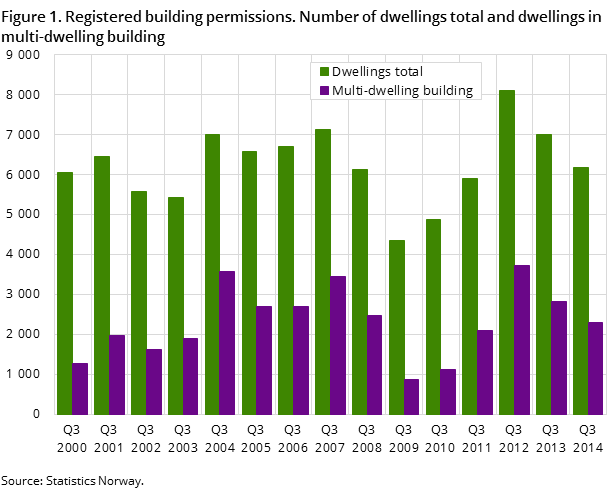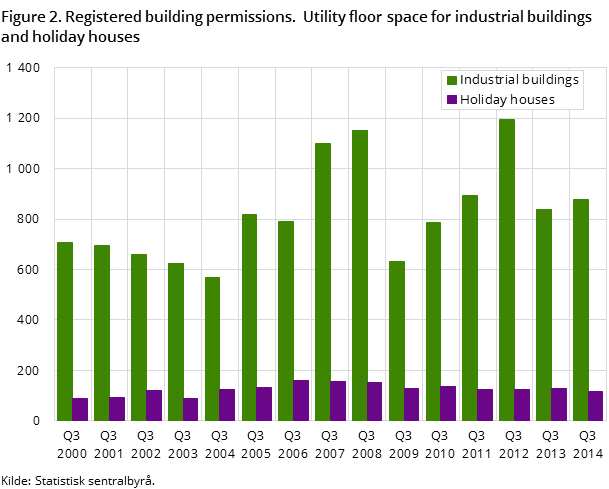Content
Published:
This is an archived release.
Decrease in permits for new flats
In the third quarter of 2014, building was given start permits on almost 6 200 dwellings, with a total of about 845 000 square metres of utility floor space. New dwellings decreased by 12 per cent compared with the second quarter of 2013.
| 3rd quarter 2013 | 3rd quarter 2014 | Changes in per cent | |
|---|---|---|---|
| Number of dwellings | |||
| Registered building permissions | 6 988 | 6 179 | -11.6 |
| Registered completed | 6 912 | 6 191 | -10.4 |
| Utility floor space other than in dwellings, 1000 m2 | |||
| Registered building permissions | 1 215.5 | 1 224.2 | 0.7 |
| Registered completed | 807.5 | 925.2 | 14.6 |


Building start permits for flats and houses with two dwellings had the greatest decrease. In the third quarter this year, the number of flats decreased by 19 per cent compared with the same period in 2013. Residences for communities, on the other hand, increased by more than 20 per cent in the first three quarters of 2014 compared with the same period last year.
Most dwelling start permits in Hordaland
The county of Hordaland had the most dwelling start permits, with 808, followed by Akershus, Rogaland and Sør-Trøndelag counties with 764, 709 and 705 dwelling start permits respectively.
Increase in industrial sector
In the third quarter of 2014, building was given start permits on about 879 000 square metres of utility floor space within the industrial sector. This is an increase of a good 5 per cent compared with the same quarter in 2013. The level of building activity is especially high within industry and storage buildings.
Registered building permissionsOpen and readClose
Figures for buildings in the building statistics rely on dates for when permits are registered by the municipality in the data register (Matrikkelen). A building permit does not always mean that construction will be started at once. Especially in low conjunctures it might be that construction projects are not realised, or may be postponed after a building permit has been granted. When the building activity trend turns from a low to a high level, and vice versa, this could affect the interpretation of the statistics.
More details about comparability, quality and other information are available in About the statistics .
Rebuilding of existing building stockOpen and readClose
Building statistics do not cover dwellings due to rebuilding of existing building stock (i.e. new dwellings due to reconstruction of utility floor space from industry to dwellings).
When an old building is being demolished to the foundation wall, it is regarded as a new building. When the building framework is not demolished, it counts as rebuilding.
For more information, see About the statistics .
Contact
-
Jens Mathiesen
E-mail: jens.mathiesen@ssb.no
tel.: (+47) 40 81 13 98
-
Magnus Espeland
E-mail: magnus.espeland@ssb.no
tel.: (+47) 45 27 40 08
